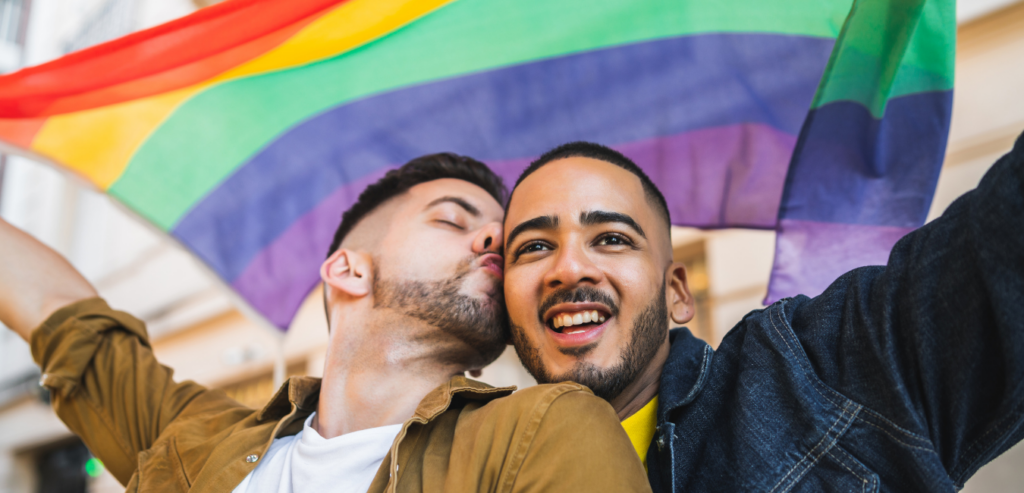Happy Pride from DVIP!

Happy Pride Month! In June we come together to celebrate the progress, history and culture of the LGBTQIA+ community. DVIP stands with our LGBTQIA+ friends and neighbors and remains committed to providing safety, shelter and community to all who need our help.
History of Pride Month
While we enjoy the parades, festivals and parties associated with Pride Month, it’s important to remember that modern Pride festivities were born from protest. The Stonewall riots were a series of demonstrations in response to a police raid that occurred in June of 1969 at the Stonewall Inn. The riots are widely considered to be one of the most important events leading to the fight for LGBTQIA+ rights in the United States.
This historic context is important. While there have been advances in LGBTQIA+ rights, discrimination and violence towards the community persist. Transgender individuals are particularly vulnerable to violence and abuse. *This year alone, over 250 bills designed to strip rights from transgender individuals were introduced around the U.S. (including Iowa). Additionally, at least 27 murders of transgender and nonbinary people have been reported in 2021. Many of the victims were Black or Latinx transgender women.
As we reflect on history and celebrate progress, we must remember that full LGBTQIA+ acceptance and equality has not yet been achieved. We must continue to protect and advocate on behalf of our LGBTQIA+ friends and neighbors, and work to build communities free of violence and discrimination.
Intimate Partner Violence and the LGBTQIA+ Community
Information about intimate partner violence in the LGBTQIA+ community is often shrouded by myths and misconceptions. These myths include the erroneous notion that women are not capable of violent behavior, that men are not commonly victims, and that LGBTQIA+ abuse is often mutual.
**Statistics show that:
- The instances of intimate partner violence with gay and bisexual men are two in five. This is on par with heterosexual women.
- ·50% of lesbian women have or will experience domestic violence at some point in their life
- ·As many as 50% of transgender individuals have experienced domestic violence, compared to nearly 33% of the general population
- Transgender individuals may experience domestic violence at the hands of family members because they are transgender or gender nonconforming.
LGBTQIA+ victim/survivors may also experience barriers to finding help. They may not be in an ‘out’ relationship, or their partner may be using the threat of ‘outing’ them for power or control. Victim/survivors in rural communities may not have access to services tailored to their needs. Additionally, victim/survivors in culturally conservative areas may feel shame or secrecy if their sexuality is not supported by the community. These barriers mean that numbers are likely higher due to underreporting.
A Survivor’s Story
Diana and her dog came to DVIP’s shelter after escaping her partner who had been physically and sexually abusing her. She was originally from another area, but chose DVIP because of our pet program and because she felt our program would be safer for her as a trans woman. With the help of our advocates and staff, Diana was able to find safety and begin healing from the violence and abuse she had endured. DVIP’s collaboration with local housing agencies gave Diana access to an apartment and rental assistance. Funding through DVIP’s Cooper’s House Kennel Program provided her new apartment’s pet deposit, meaning she didn’t have to worry about being separated from her dog. Diana found employment and her advocate was able to refer her to a therapist who specializes in the trauma that is unique to the LGBTQIA+ community.
Diana says, “When I came to shelter, I was terrified and alone. DVIP helped me by accepting and supporting me. They made me realize that I deserve safety and love.”
At DVIP, we recognize that all victim/survivors need to be believed, seen, and cared for. We also recognize that the LGBTQ+ community is not immune to issues of intimate partner violence. We are, and always will be, committed to providing safety and support for every victim/survivor who needs us.
*Source: GLAAD
**Source: domesticshelters.org, National Coalition Against Domestic Violence